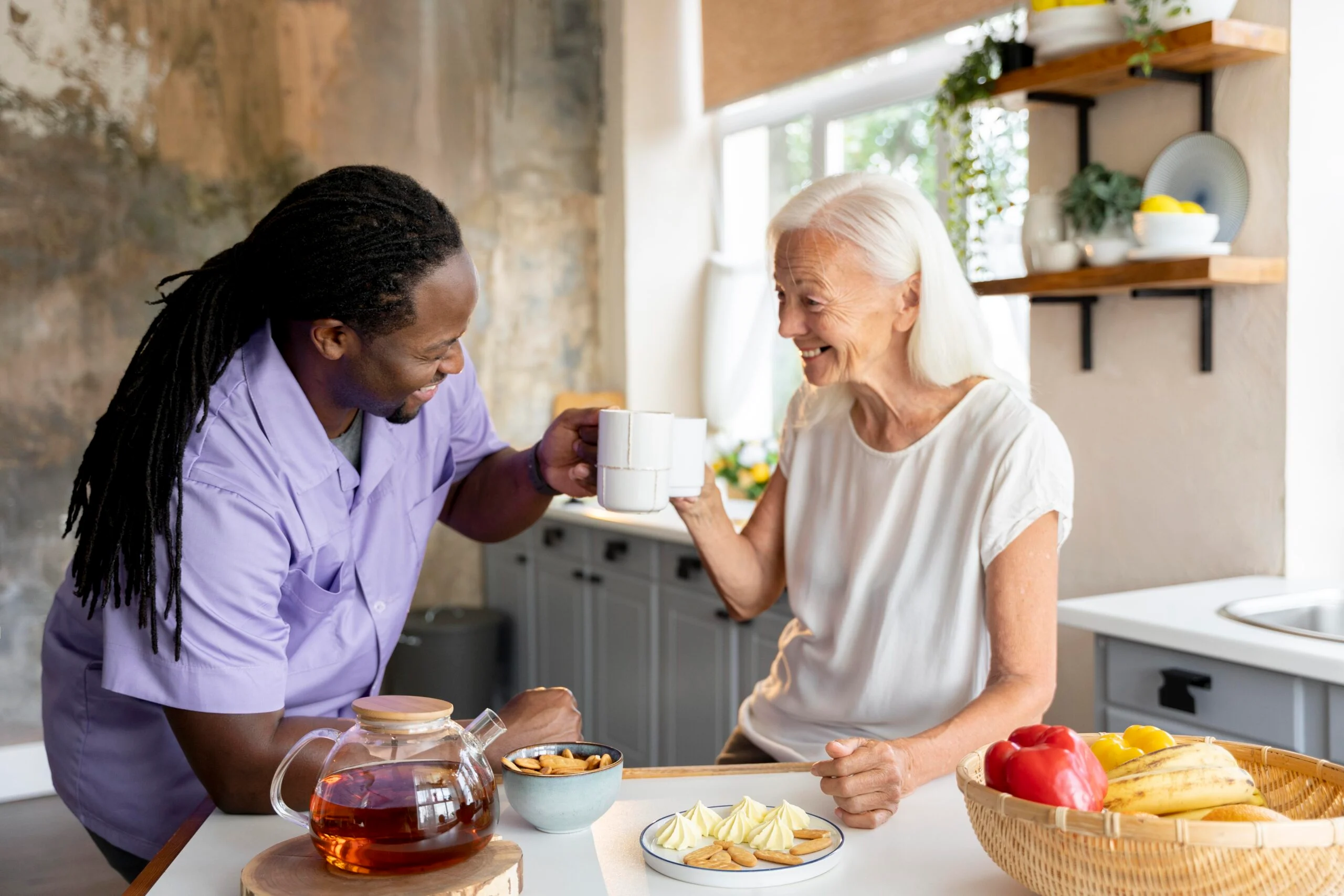The Profound Impact of Social Connection
Research has consistently demonstrated that meaningful social connections play a crucial role in health outcomes for older adults.
A landmark Harvard study spanning nearly 80 years found that close relationships were better predictors of long, happy lives than genetics, wealth, or social class.
Regular social interaction isn’t just pleasant for seniors, it’s essential for cognitive function, emotional health, and even physical resilience.
Some of the documented benefits of consistent social engagement include:
- Lower rates of depression and anxiety
- Reduced risk of cognitive decline and dementia
- Better management of chronic health conditions
- Stronger immune system function
- Increased motivation for self-care and healthy habits
Despite these benefits, many seniors find their social circles naturally shrinking as they age. Friends and family may move away, mobility limitations can make getting out more difficult, and the loss of driving privileges often further restricts social opportunities.
Beyond Basic: The Elderly Companion Care Difference
While many care options focus primarily on physical needs or medical support, companion care addresses something equally vital: the human need for connection.
Companion caregivers bring conversation, shared activities, and a genuine relationship into seniors’ daily lives.
Effective companion care typically includes:
Meaningful Conversation and Active Listening
Having someone who asks thoughtful questions, shares interesting discussions, and truly listens can transform a senior’s day. These conversations stimulate the mind, validate experiences, and maintain communication skills.
Shared Activities That Spark Joy
Whether it’s tending a small garden, playing card games, cooking together, or enjoying music, companions engage in activities that bring purpose and pleasure. These shared experiences often reignite interest in once-beloved hobbies.
Connection to Community and Outside World
Companions can provide transportation to community events, religious services, or social gatherings. They also bring news, stories, and fresh perspectives from outside the home, keeping seniors connected to the broader world.
Support for Practical Needs
While the focus is on relationship, companions also help with meal preparation, light housekeeping, medication reminders, and other daily tasks that might otherwise become barriers to independence.
Read more: The Companion Care Difference: Transforming Daily Routines into Meaningful Moments
The Neurological Benefits of Companionship for Elderly

The brain thrives on social interaction. Neuroscience research shows that social engagement activates multiple brain regions and strengthens neural connections. For older adults, regular conversation and shared activities can help maintain cognitive function through several mechanisms:
Mental Stimulation Through Dialogue
Conversation requires complex cognitive processes – from language processing to memory retrieval to social reasoning. Each interaction exercises these neural pathways, potentially helping preserve cognitive function.
Stress Reduction
Chronic stress accelerates cognitive aging and compromises immune function. Meaningful social connections reduce cortisol levels and trigger the release of oxytocin – the “bonding hormone” that creates feelings of trust and safety.
Improved Sleep Quality
Loneliness and isolation often disrupt sleep patterns, while regular social engagement tends to normalize circadian rhythms. Better sleep directly impacts cognitive health, immune function, and overall well-being.
Physical Health Benefits That Extend Longevity through Elderly Companion Care
The mind-body connection means companion care’s benefits extend beyond emotional well-being to impact physical health in measurable ways:
Better Nutrition Through Shared Meals
Seniors living alone often develop poor eating habits, skipping meals, or relying on processed convenience foods. Companion care typically includes meal preparation and the social aspect of shared eating, which naturally improves nutrition intake.
Increased Physical Movement
Having a companion encourages more physical activity, whether through deliberate exercise, household activities, or outings. Companion care can help your loved one by creating an exercise plan that helps maintain strength, balance, and cardiovascular health.
Medication Adherence and Consistency
Medication errors and missed doses are common problems for isolated seniors. Regular companion visits that include medication reminders improve consistency with prescribed treatments, potentially preventing complications.
Earlier Detection of Health Changes
Regular interaction means subtle health changes rarely go unnoticed. A companion who sees a senior consistently can often spot concerning changes before they become serious problems, allowing for earlier intervention.
Finding the Right Companion Care Solution
Finding the right match for your loved one is what makes companion care truly effective. The best companions connect on a personal level, sharing interests and values that make their time together genuinely enjoyable rather than simply transactional.
When exploring options for your family member, consider these important factors:
Personal Connection and Compatibility
The foundation of effective companion care is a genuine connection. Look for providers who prioritize matching based on personality, interests, and communication styles. A shared love of gardening, music, books, or even specific TV shows can create natural conversation points and shared activities.
Consistency of Care
Building trust and comfort takes time. Ask about the stability of companion relationships and how consistency is maintained. Regular visits with the same companion allow for deeper understanding and more meaningful support.
Communication Approach
Good companion care includes clear communication with family members. Discuss how updates will be shared, concerns addressed, and how the companion and family can collaborate to support your loved one’s changing needs.
Flexibility to Evolve
As circumstances change, companion care should adapt accordingly. The right solution will offer options to adjust visit frequency, activities, and support levels as needed.
Training and Background
While companion care focuses on social and emotional support rather than medical care, companions should still have appropriate screening, training in senior communication, and understanding of common age-related challenges.
Making Companion Care Affordable

Many families worry about the cost of companion care, but there are often more options than they realize:
Flexible Scheduling
Even a few hours of companion care weekly can provide significant benefits. Starting with shorter visits or fewer days per week makes companion care more accessible for many families.
Insurance and Benefit Programs
Some long-term care insurance policies cover companion services. Additionally, veterans may qualify for benefits that include companion care, and some Medicare Advantage plans now offer limited companion benefits.
Tax Considerations
In some cases, companion care expenses may qualify as dependent care services, potentially offering tax advantages. Consulting with a tax professional can clarify eligibility.
Family Coordination
Some families create hybrid solutions where family members provide some companion time while professional companions fill gaps in the schedule, making comprehensive support more affordable.
The Family Role in Companion Care
Professional companion care works best when it complements rather than replaces family involvement. When introducing companion care:
Read more: Signs Your Loved One Needs Elder Care: What to Watch For and How to Start the Conversation
Share Family History and Traditions
Providing companions with information about your loved one’s life story, accomplishments, and interests creates richer conversation opportunities.
Maintain Regular Communication
Stay involved through regular check-ins with both your loved one and their companion. This creates a supportive team approach to care.
Observe and Adjust
Pay attention to which companion activities bring the most joy or engagement to your loved one, and share these observations to help refine the care approach.
Conclusion: Connection as Essential Care
Elderly companion care represents an evolution in how we think about supporting aging loved ones. Rather than focusing exclusively on physical needs, this approach recognizes that meaningful human connection is as essential to health as proper nutrition or medication.
By providing regular social interaction alongside practical support, companion care helps seniors maintain both their independence and their joy in living.
The resulting benefits to mental health and longevity make companion care not just a compassionate choice, but a pragmatic one for families who want their loved ones to thrive in their later years.
At Kizuna, we believe in the power of genuine connection and thoughtfully matched companion caregivers who create meaningful relationships with seniors.
Our collaborative approach ensures consistent, personalized care that addresses both practical needs and the essential human need for connection.
When exploring companion care options, focus first on finding a genuine connection and compatibility. The right match creates relationships that enrich life rather than simply maintaining it, allowing elderly loved ones to continue growing, learning, and finding purpose at any age.

